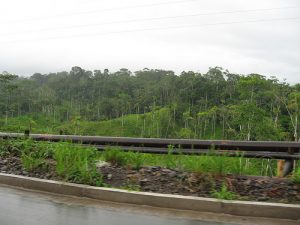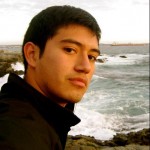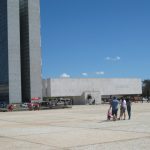 The Wooster in Ecuador 2010 group is proud to offer the campus and surrounding community a chance to come and learn about conservation biology in the tropics. We will present our experiences and discoveries about open pit mining & rain forests, oil pipelines & indigenous cultures, and monkeys vs. birds. Come check out our speakers, Caitlin Popa & Erin Plews-Ogan, as they show pictures, data, etc. on Thursday, November 11th AT 6:30 pm in Lowry Lounge.
The Wooster in Ecuador 2010 group is proud to offer the campus and surrounding community a chance to come and learn about conservation biology in the tropics. We will present our experiences and discoveries about open pit mining & rain forests, oil pipelines & indigenous cultures, and monkeys vs. birds. Come check out our speakers, Caitlin Popa & Erin Plews-Ogan, as they show pictures, data, etc. on Thursday, November 11th AT 6:30 pm in Lowry Lounge.
Kendall-Rives Research Grant
 The Kendall-Rives Latin American Research Grant for Sophomores and Juniors makes approximately $2,000 available each year to one or more Wooster sophomores or juniors to support a research project on some aspect of United States-Latin American Relations. Funds are to be used during the current academic year, including the summer months. Research projects must be conducted in a Latin American country in preparation for, or as part of, a senior Independent Study project in any major. Successful projects in the past have included creating a documentary about a Mapuche fair trade artisans’ cooperative in Chile; an archaeological excavation in Honduras; research in Reynosa, Mexico, to gather information to create a testimonio; a semester in Chile and Argentina examining the process of national reconciliation; participant observation in hair salons in the Dominican Republic; and interviews with street musicians in Cuzco, Peru.
The Kendall-Rives Latin American Research Grant for Sophomores and Juniors makes approximately $2,000 available each year to one or more Wooster sophomores or juniors to support a research project on some aspect of United States-Latin American Relations. Funds are to be used during the current academic year, including the summer months. Research projects must be conducted in a Latin American country in preparation for, or as part of, a senior Independent Study project in any major. Successful projects in the past have included creating a documentary about a Mapuche fair trade artisans’ cooperative in Chile; an archaeological excavation in Honduras; research in Reynosa, Mexico, to gather information to create a testimonio; a semester in Chile and Argentina examining the process of national reconciliation; participant observation in hair salons in the Dominican Republic; and interviews with street musicians in Cuzco, Peru.
If you are interested in learning more about the Kendall-Rives Latin American Research Grant, please contact Professor Pamela Frese, Chair of the Kendall-Rives Committee. Applicants must submit to Professor Frese a detailed research proposal and a letter of recommendation from their academic advisor. Students should demonstrate their ability to converse in either Spanish or Portuguese, defined minimally as having satisfactorily completed at least two years of college-level language study or its equivalent.
The deadline for applications is Monday, November 8.
Brazil Initiation Scholarship
The Brazil Initiation Scholarship (BIS) is a key component of BRASA‘s agenda to expand Brazilian Studies in the United States. BRASA invites applications from graduate and undergraduate students for a one-time $1,500 travel scholarship to do exploratory research or language study in Brazil. This scholarship targets aspiring Brazilianists with relatively little or no experience in Brazil. It seeks to contribute to the student’s initial trip (for a period from six weeks to three months), to heighten the student’s interest in Brazil, and deepen his/her commitment to Brazilian studies in the United States. Students are encouraged to combine this scholarship with other grants or awards. Recipients will be recognized on the BRASA web page in January 2011. Funding will be disbursed prior to travel. BRASA will award four fellowships in this competition.
Eligibility
Proposals for the BRASA BIS will be reviewed according to the following criteria:
Highest priority will be given to applicants who are outstanding college seniors, recent college graduates applying to graduate programs in Brazilian studies or in Latin American studies with the intent of focusing on Brazil, or new graduate students already focusing on Brazil;
- Students from all disciplines in the humanities and social sciences are eligible. In exceptional cases, applications from the natural sciences will be given consideration (for example, someone in environmental sciences who is writing a dissertation on the Amazon or pollution in São Paulo and who plans to continue research on Brazil);
- Preference will be given to those applicants who have little or no in-country experience in Brazil;
- A student requesting funding to undertake an exploratory research trip should present evidence at the time of the application that he/she has achieved at least an intermediate level of competence in the Portuguese language sufficient to carry out the proposed research;
- An applicant seeking support to undertake language studies should present evidence that after returning to the US he/she intends to continue studying Portuguese and plans to engage in research on Brazil;
- Successful applicants may combine BIS with other grants, scholarships, or awards, as long as he/she specifies clearly how the funds are going to be spent (for example, the BRASA scholarship might be used to cover travel costs, while a grant from another source could be used for living expenses, etc.).
Application Process
A complete application (partial applications will not be considered) will include the following documents:
- The application cover page (download form);
- A two-page prospectus (double spaced, 12-point font);
- A two-page résumé or CV;
- A budget specifying how the $1500 will be spent;
- In the case of undergraduates or recent college graduates, a letter of intent to study Brazil in graduate school;
- If applying for exploratory research, include a two-page bibliography on the subject of study, and present evidence that the applicant has achieved at least an intermediate level of competence in Portuguese (competence can be demonstrated by a transcript or a letter from a university instructor of Portuguese);
- If applying for Portuguese language study, the name of the school should be specified;
- Proof of membership in BRASA
- Two letters of recommendation from professors; and
- Copies of undergraduate and graduate transcripts.
(The letters of recommendation and transcripts may be mailed directly to BRASA at the address below. All other materials should be submitted together either as PDF or MSWord files in a single email to brasa@vanderbilt.edu<mailto:brasa@vanderbilt.edu>.)Evaluation Criteria and Selection Process
In order to be considered for the scholarship, the two-page
prospectus should:
- Clearly and coherently outline the project’s engagement with Brazil;
- Demonstrate as precisely as possible the feasibility of the proposed project (exploratory research or language study) and how it will contribute to the student’s academic development;
- Briefly discuss the role the work undertaken in Brazil will play in shaping the applicant’s future course of academic study (for instance, it could be the seed project for a larger grant application, provide the basis of a paper prepared for presentation at a BRASA conference, or serve as the foundation for future research on Brazil).
Report
Upon completion of the research experience in Brazil, recipients are required to file a two-page, double-spaced report with the BRASA Executive Director summarizing their activities and identifying relevant academic outcomes. In addition, a statement accounting for the expenditure of funds must be sent to the BRASA Executive Director. If the scholarship was used to study Portuguese, recipients should attach a certificate from the school where language studies were conducted. Following completion of studies in Brazil, BRASA strongly encourages recipients to participate in a subsequent BRASA congress in order to report on their activities.
Deadline for application: October 15, 2010
Awards will be announced by January 31, 2010
To submit a proposal and for all other correspondence regarding this award, contact:
BRASA
VU Station B 350031
2301 Vanderbilt Place
Vanderbilt University
Nashville, Tennessee 37235-0031
U.S.A.
615-343-1764 (tel)
615-343-6002 (fax)
email: brasa@vanderbilt.edu
Christopher Culbertson’s work with Fundación Chol-Chol in Chile
 Christopher Culbertson (Cultural Area Studies: Latin American History) has always had an intensely personal interest in Chilean culture and history. Christopher was born in Santiago to a Mapuche woman, but has lived in the United States since he was six months old. He and his North American family have traveled to Chile in the intervening years, keeping his ties to the country strong.
Christopher Culbertson (Cultural Area Studies: Latin American History) has always had an intensely personal interest in Chilean culture and history. Christopher was born in Santiago to a Mapuche woman, but has lived in the United States since he was six months old. He and his North American family have traveled to Chile in the intervening years, keeping his ties to the country strong.
This summer as the recipient of the 2009-2010 Kendall-Rives Latin American Research Grant, Christopher traveled to Temuco, Chile to investigate Mapuche cultural identity. The Kendall-Rives Grant funds student research by sophomores or juniors conducted in a Latin American country as part of an Independent Study project on some aspect of U.S.-Latin American relations. The opportunity to do research abroad enhances both student language skills and depth of knowledge about Latin American peoples and cultures.
As part of his preparation for his Independent Study project, Christopher worked with the Fundación Chol-Chol (Chol-Chol Foundation), a Mapuche non-governmental organization that promotes the preservation of indigenous culture by marketing artisans’ work through a fair-trade cooperative. The foundation asked Christopher to design a project that would both further his scholarly research and provide a needed product for the community. Christopher proposed creating three short documentaries featuring Mapuche artisans and the fair-trade cooperative that the foundation could use as part of their fundraising and marketing.
[youtube 2hpQDT9hOL0]
Working alongside Chol-Chol volunteers, Christopher participated in presentations about Mapuche culture for local schools, interviewed Mapuche poets, and documented the work of Mapuche artisans. While he gathered material for the documentary, he furthered his research into Mapuche cultural identity. Christopher wanted to understand how the Mapuche construct their identity within a larger Chilean culture that presents them as “timeless” relics belonging to the past, and at the same time attempts to deny them space within the construction of contemporary Chilean public life.
While in Temuco, Christopher wrote a research blog reflecting on his experience negotiating multiple identities as a Mapuche and a Chilean raised outside of the larger community. His work culminated with an original documentary on the history of the Fundación Chol-Chol available on Youtube. Christopher’s project is a wonderful example both of the possibilities opened for student growth opened by supporting I.S. research in Latin America, and a thoughtful service project that benefited both the student and his host community.
Christopher’s experience working in Chol-Chol presented an additional opportunity for him to investigate his identity within the Mapuche community. Through interviews about his work and personal history disseminated through regional radio stations and newspapers, Christopher was able to contact his Mapuche family. The chance to meet his biological mother and extended family was an unexpected reward.
Check out Christopher’s blog, and keep your eyes posted for the call for this year’s Kendall-Rives Grant competition this fall. Who knows what opportunities for intellectual growth and personal discovery await!
